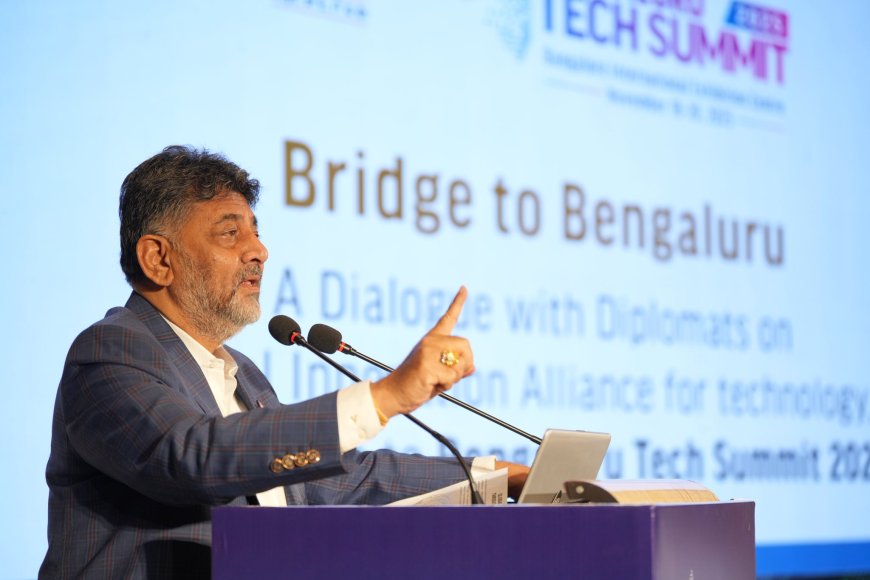“Bridge to Bengaluru”: Karnataka’s Global Tech Push Ahead of BTS 2025
Ahead of Bengaluru Tech Summit 2025, Karnataka’s “Bridge to Bengaluru” campaign is wooing global tech investors, promoting AI and deep tech, and positioning the city as a global AI-metropolis.

As the countdown begins for the Bengaluru Tech Summit (BTS) 2025, Karnataka has launched a bold new global initiative titled “Bridge to Bengaluru”—a strategic campaign designed to position Bengaluru as the world’s most compelling AI-powered innovation hub. The initiative is not merely a prelude to the tech summit; it is a robust diplomatic and economic outreach aimed at attracting international investors, R&D labs, and tech entrepreneurs to India’s most dynamic technology ecosystem.
From San Francisco to Singapore, “Bridge to Bengaluru” is tapping into global networks to showcase why Bengaluru is no longer just the Silicon Valley of India, but a central node in the world’s digital transformation.
What is “Bridge to Bengaluru”?
“Bridge to Bengaluru” is a Karnataka government-led global engagement program initiated in advance of the 28th edition of the Bengaluru Tech Summit, scheduled for late 2025. The initiative aims to:
-
Forge cross-border technology partnerships
-
Invite FDI from multinational innovation companies
-
Establish new corridors for AI, quantum, deep tech, and climate tech collaboration
-
Highlight Bengaluru’s capabilities in emerging technologies to global investors
The campaign is being executed by the Department of Electronics, IT, Bt and S&T, with support from KITS (Karnataka Innovation and Technology Society) and in partnership with global accelerators, trade missions, and diaspora-led VC firms.
Strategic Focus: From AI to Climate Tech
Karnataka is strategically aligning its economic development agenda with the technologies of the future. Through “Bridge to Bengaluru,” the state is inviting stakeholders across the AI, robotics, deep tech, fintech, climate tech, medtech, and quantum computing domains to participate in Bengaluru’s evolution into an AI-metropolis.
AI and ML Startups: Bengaluru is already home to over 3,000 AI startups, including unicorns that specialize in generative AI, health diagnostics, and automated logistics. The initiative aims to add 300 new foreign-invested AI startups by 2026.
Climate and Clean Tech: With the rise of ESG mandates and green investment, Karnataka is positioning Bengaluru as a hub for decarbonization technologies, battery storage innovations, and sustainable urban planning models.
Quantum and Deep Tech R&D: Several European and American universities have been invited to set up joint innovation labs, offering students and scientists access to India’s growing base of quantum computing research.
Global Roadshows: Taking Bengaluru to the World
As part of the campaign, Karnataka officials and private sector delegates are embarking on multi-city international roadshows across:
-
North America (San Francisco, Toronto, Austin)
-
Europe (London, Berlin, Paris)
-
Asia-Pacific (Tokyo, Singapore, Seoul)
-
Middle East (Dubai, Tel Aviv)
These roadshows include tech expos, startup investor meets, bilateral MoUs, and presentations on the innovation policies driving Bengaluru's rise. Specific focus is being given to engaging with the Indian diaspora who have created unicorns and deep-tech ventures abroad.
Policy Sweeteners and Infrastructure for Global Entrants
The success of any global tech initiative depends not just on visibility, but policy support. Karnataka is ensuring that international investors see ease of doing business, scalability, and stability as part of the Bridge to Bengaluru value proposition.
Key incentives being offered include:
-
Fast-track clearances for foreign tech investments
-
Plug-and-play infrastructure in newly designated innovation districts
-
R&D subsidies, IP protection, and single-window clearances
-
Co-innovation schemes with public sector adoption opportunities
The Bengaluru Tech Corridor, now extended under the initiative, connects major tech parks like Whitefield, Electronic City, and the upcoming Satellite Tech Towns, offering top-tier global connectivity and collaborative spaces.
Building Bengaluru as the AI Metropolis
Beyond infrastructure, the “Bridge to Bengaluru” narrative is centered on Bengaluru’s transformation into an AI-powered metropolis—a city that thrives not just on software development, but on urban intelligence, data-driven governance, and citizen-centric design.
Recent AI deployments in Bengaluru include:
-
Traffic optimization using machine learning algorithms
-
Smart water management through IoT and predictive analytics
-
AI-assisted healthcare delivery in urban PHCs
-
Blockchain-based land registration models
The goal is clear: make Bengaluru the prototype for AI-led urban life, a model that can be replicated across global cities.
Collaborative Ecosystems: Universities, Startups, and VCs
“Bridge to Bengaluru” is also fostering collaborative ecosystems between:
-
IITs, IIITs, and global universities
-
Local AI and robotics startups
-
Global venture capital firms and incubators
The initiative has already resulted in over a dozen MoUs being signed with international tech parks and academic institutions, allowing for student exchange, research fellowships, and startup acceleration.
Momentum Ahead of Bengaluru Tech Summit 2025
With BTS 2025 shaping up to be the largest edition yet, “Bridge to Bengaluru” is acting as the global lead-in to a tech summit that will feature over:
-
500 exhibitors
-
3,000 startups
-
40+ country delegations
-
10 international country pavilions
International participation has seen a sharp rise, with Israel, South Korea, Germany, and Canada pledging official representation. Delegates from Silicon Valley-based AI labs and EU climate-tech coalitions are already confirming their attendance.
Karnataka’s Tech DNA and the Bigger Vision
Karnataka’s ambition is not limited to hosting a successful event. The larger vision is to position Bengaluru as a global headquarters for ethical, scalable, and people-centric technology. With over 400 R&D centers, 200 Fortune 500 company offices, and a mature startup culture, Bengaluru offers what few global cities can: innovation, affordability, and inclusivity.
The “Bridge to Bengaluru” initiative is thus both a celebration and a strategy—celebrating the journey of India’s tech capital while strategically scripting its next decade.
Conclusion
In an era where cities are competing not just for investment but for global relevance, Karnataka’s “Bridge to Bengaluru” campaign marks a turning point in how India engages with the world’s tech future. With its eyes firmly set on BTS 2025, the state is not waiting for innovation to arrive—it’s building the bridge for it to walk across.


















































